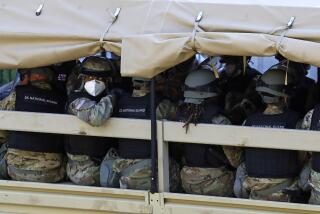Experts Split Over New Role for National Guard
- Share via
WASHINGTON — A proposal to give the National Guard a broader role in defending an increasingly vulnerable U.S. homeland would provide a badly needed new mission for the organization, but it may fit poorly with the Guard’s desires and capabilities, some defense analysts say.
In a report to be released today, a congressionally mandated panel has urged that the Guard take an expanded role in countering the threat of attack from chemical or biological weapons, along with other unconventional threats. The advisory group, called the National Defense Panel, contends that the military has not moved quickly enough to counter the new dangers from enemy nations and groups, and argues that the Guard is well-suited to help respond to such emergencies because of its routine contacts with local civilian agencies.
The proposal tracks with a Pentagon initiative, announced last week, to give the 400,000-member Guard new responsibilities to help lead the response to chemical or biological attacks.
Defense officials have sought a new role for an organization they believe to be underused but backed by too much grass-root political support to be eliminated. The Pentagon has been “looking desperately for missions for the National Guard,” said one high-ranking defense official, adding that officials understand that “they won’t go away.”
Some analysts believe, however, that the Guard’s training level and historic mission make it a poor choice for a job requiring quick reaction and highly specialized technical expertise.
“You’re talking about handing them one of the most time-sensitive, least clear-cut threats out there,” said Daniel Goure, a defense expert at the Center for Strategic and International Studies in Washington. “They may be one of the worst choices for this,” he said.
Moreover, Goure said, because their units might be called to active duty during a national emergency, many would be unavailable for such civil-defense responsibilities in time of war.
Guard members generally train one weekend a month and two weeks a year. Although they have a long tradition of helping local authorities with natural disasters, riots and similar emergencies, their first mission is to take part in war.
They lag behind active-duty Army units and the Marines in receiving training to defend against chemical and biological weapons.
One panel official, who asked to remain unidentified, acknowledged that the Guard does not have the technical expertise to train civilian agencies in countering such threats.
“We have to get them ready,” he said, as other agencies also must learn how to deal with the various aspects of the new threat.
Any expansion of the National Guard’s mission could have a significant impact in California. The Army National Guard has 17,000 members in California and a fiscal 1998 operations budget of $155 million. An additional 4,900 Californians belong to the Air National Guard.
Cutbacks in overall defense spending have created myriad problems for the Guard in California and other states, making the new proposals potentially welcome.
But Lawrence Korb, who as a Pentagon official in the 1980s had authority over the Guard, speculated that the organization might not like an assignment if it conflicted with its war-waging mission. “They see their first role as helping fight wars,” he said.
Richard N. Haas, a former Bush administration national security aide at Brookings Institution, agreed that there would probably be “a lot of resistance” from the Guard because the change would blur war and policing roles.
Korb and Haas, however, said they believe that the role could be a good fit for the organization.
Some Guard officials declined to comment, saying they would wait for the report to become public.
Although 95% of the National Guard’s funding comes from the federal government, Guard units are subject to state authority and can be called into action to help in natural disasters and civil emergencies.
The National Defense Panel report recommends that the National Guard, “together with the Army Reserve, be prepared to train local authorities in chemical and biological weapons detection and decontamination, assist in casualty treatment and evacuation, quarantine if necessary affected areas and people, and assist in restoration of infrastructure and services.”
But even as it calls for the Guard to develop what amounts to a new specialty, the report calls for a significant downsizing of the Guard. That recommendation will probably be well received at the Pentagon but resisted in Congress and among Guard officials.
The panel’s proposal comes one week after Defense Secretary William S. Cohen, at an event to publicize a report on the spread of weapons of mass destruction, called for the Guard to broaden its role in responding to attacks by chemical and biological weapons.
More to Read
Sign up for Essential California
The most important California stories and recommendations in your inbox every morning.
You may occasionally receive promotional content from the Los Angeles Times.










